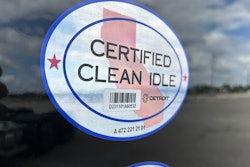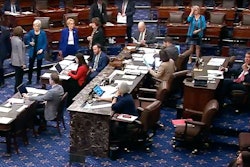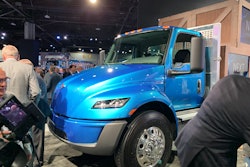Legislative action last week effectively revoked California's authority to set its own emissions policies, but the California Air Resources Board (CARB) believes that while the agency may be down, it's not out.
California Governor Gavin Newsom said the state would file a lawsuit to block Congress from taking the state’s ability to set emissions rules and overturning the rules already enacted, and CARB told CCJ Wednesday it plans to move forward with an emissions plan previously agreed to by all the major North American truck OEMs.
Cummins, Daimler Trucks North America, Hino, Isuzu, then-Navistar, Paccar, the Truck and Engine Manufacturers Association, and Volvo Group North America in July 2023 were among 11 signers of the Clean Truck Partnership (CTP), an agreement with CARB that pledged truck and engine manufacturers will meet California’s vehicle standards and required the sale and adoption of zero-emission (ZE) technology, "regardless of whether any other entity challenges California’s authority to set more stringent emissions standards under the federal Clean Air Act."
Joint Resolutions 87 and 89, each passed by Congress and needing now only President Trump's signature, formally provide congressional disapproval under chapter 8 of title 5, United States Code, of the rules submitted by the Environmental Protection Agency relating to California Truck Emission Standards (CARB's Omnibus rule) and California Truck NOx Emission Standards (CARB's Advanced Clean Trucks regulations), respectively. Both of those regulations are benchmarks in the 16-page agreement, but CARB contends recent legislative actions do not impact the CTP.
"Our position is that, right now, there’s been no change to the CTP, and we don’t expect any," a CARB official told CCJ Wednesday. The official declined to say whether CARB had shared its position with the truck and engine OEMs.
At the Advanced Clean Transportation Expo in California last month, CARB Principal Deputy Executive Officer Courtney Prideaux Smith too stated her belief that even with ACT waivers pending repeal, heavy truck OEMs are bound to their commitment to the terms of the CTP.
What does the CTP say?
Language in the agreement calls for OEMs to meet both the Omnibus regulation as it existed on Dec. 22, 2021, the ACT regulation as it existed on March 15, 2021, and the 100% ZEV sales requirement set forth in Cal. Code Regs title 13, section 2016, as it existed on April 28, 2023.
The OEMs committed to comply with the 2027 and later model year provisions of the Omnibus regulations "irrespective of the outcome of any litigation that has been filed or may be filed challenging the waivers or authorizations for those regulations or CARB’s or any state’s overall authority to implement those regulations," and to "commit to put forth their best efforts to sell as many zero emission trucks as reasonably possible in every state that has or will adopt CARB’s ACT regulations, even potentially exceeding any future U.S. EPA Phase 3 Greenhouse Gas requirements, irrespective of the outcome of any litigation that has been filed or may be filed challenging the waivers or authorizations for those regulations or CARB’s or any state’s overall authority to implement those regulations."
In exchange for meeting the guidelines and agreeing not to support legal challenges in implementation in California and other states that follow CARB's regulations, CARB extended legacy engine provisions flexibility through model year 2026, allowing engine manufacturers for model year 2024 to certify legacy engines prior to certification of Omnibus-compliant engine families, and allowing manufacturers to offset any increases in NOx or PM emissions by undertaking projects targeted at California disadvantaged communities in the same model year that they utilize the proposed legacy engine provisions. Manufacturers were also allowed to carry over deficits from model years 2024 to 2025 and offset with HD-ZEP credits – credits awarded to manufacturers for producing and selling zero-emission vehicles (ZEVs) – without any applicable multipliers.
Is there controversy?
As part of the CTP, the OEMs agreed to abide by ACT regardless of any outcome of litigation. But repealing the regulations isn't litigating them, noted Clean Freight Coalition Executive Director Jim Mullen.
"I would submit that if ACT waivers are rescinded, the CTP is nullified," he said. "The agreement says (the OEMs) agree to abide regardless of the outcome of litigation. Litigation is not the issue. What's the issue is Congress said 'You don't have a waiver anymore,' therefore, there's no waiver. I think they wish they had written it differently, but the fact of the matter is they didn't. The words matter."
The Clean Freight Coalition late last year called on the OEMs to walk away from the partnership, and Nebraska Attorney General Mike Hilgers filed an antitrust lawsuit against several OEMs over the agreement. The American Trucking Associations followed that lawsuit with its own call on the OEMs to abandon the partnership.
At the very least, Mullen said, revoking the waivers that enabled CARB's ACT and Omnibus rules means neither of those regulations can be implemented in the nearly dozen other states that had adopted them and, as the CTP was an agreement with only the State of California, the OEMs have no duty to any of those states.
John Mies, senior vice president of corporate communications for Mack and Volvo Trucks parent Volvo Group, told CCJ his company intends to keep its sales policies in California "as they are for now. For the opt-in states, removal of these regulations would increase availability of new diesel-powered vehicles because our entire product line would be available again in those states for immediate sale and delivery."
Other truck and engine OEMs, and the Truck and Engine Manufacturers Association, did not respond to CCJ's request for comment.
Mullen said he has personally spoken with two OEMs that he did not name, and said they agreed that the CTP was null and void.
"I think what the OEMs are debating internally is, 'Are we going to treat California in an isolated position, do whatever we want in the other 49 states, and let California figure out if they want to be the only outlier?' And then, 'What are we going to do in California if that's what we do?' Or 'Are we going to tell them to pound sand, and we're out of the CTP all together?'" he said. "There's not certainty in the field right now on this."











